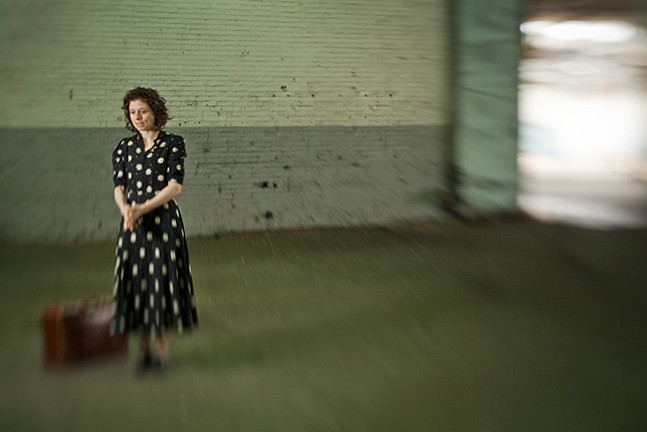“I didn’t like the diaries at first at all,” says Stein, an author
Then something changed. “It shifted into as if she was sitting next to me whispering in my ear and inviting me into parts of myself that I had never visited,” says Stein. “I was suddenly in the presence of a very intimate friend, and I did not want to leave that experience, as disarming and sometimes uncomfortable and funny and wonderful and exciting and weird as it was.”
Stein goes on to say, “I don’t think of myself as inhibited or judgmental, but I was judging her. And I’m not sure why. I think it invites us to look at ourselves as readers because it’s very different to read a diary. If there’s one place you get to be a drama queen, it’s your diary.”
When they finished, they wondered why they had never heard of Hillesum and wanted to expose more people to her story. With the help of director Austin Pendleton, Stein began to adapt and perform the work, as well as other correspondences from Hillesum’s life, as a one-person show. Over the years, they read in front of audiences, taking feedback and reworking the script until it evolved into Etty, the show playing Feb. 7-10 at off the WALL Productions.
“The [show] from 2009 is so different from the one now,” says Stein.
Drawn entirely from Hillesum’s diaries and letters from 1941-1943, Etty delves into the intensely candid writings of a young Dutch woman. Though the diaries were published in the 1980s, and, at one time, spent weeks on the New York Times bestseller list, Hillesum fell into obscurity as one the few female voices of the Holocaust, on par with the far more well-known Anne Frank. Even so, Stein sees both as “young, highly assimilated Jewish women who choose the resistance of writing to bear witness to their circumstances.”
“They’re both great writers, and they’re both these sensual beings and products of the enlightenment, even though that enlightened Europe was not existing at that moment,” says Stein.
But unlike Frank’s diary, which Stein says was heavily edited and censored, Hillesum remains “flawed and complicated and complex,” giving insight to the real inner lives of women at the time.
“My play at best is a glimpse into this complex and remarkable sensibility of this young woman who is caught in these circumstances and this catastrophe, and even in that is committed to becoming herself, whatever that entails,” says Stein.
But, as Stein points out, Hillesum’s journey “goes against a conventional Jewish narrative for the Holocaust” by focusing less on the genocide, and more on the challenges women faced at that time. To help treat her depression, Hillesum participated in an unconventional form of therapy with a doctor whose questionable treatments included palmistry and wrestling with his patients, sometimes naked. She was a single, sexually active woman uninterested in marriage or having children at a time when such a thing was taboo. She self-aborted a pregnancy.
Though Hillesum lived over 50 years ago, Stein sees a variety of parallels between her experiences and those of women now.
“It’s really interesting doing the play in light of the #MeToo movement because women have really responded to it differently since last year,” says Stein. “We’re having different conversations.”
The show also has become more meaningful in light of recent events. Stein recalls how, just days after the mass shooting at the Tree of Life synagogue in Pittsburgh, they did a standing-room-only performance of Etty in California.
“She’s surfacing now because we need her voice,” says Stein.
Etty. Thu., Feb. 7-Sun., Feb. 10. 25 W. Main St., Carnegie. $5-20. insideoffthewall.com



